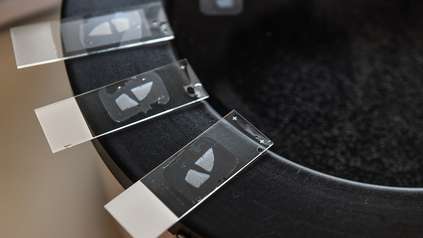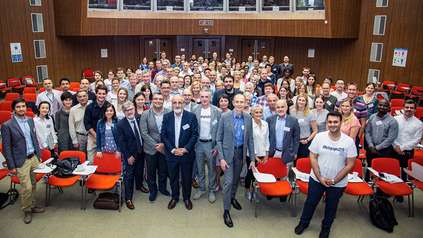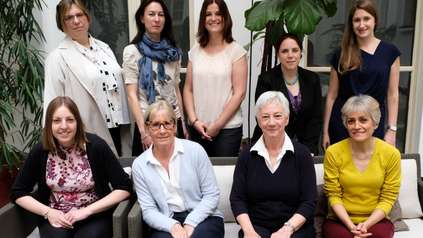Scientists unlock secret behind how smoking and drinking alcohol causes cancer
Listen to this news story:
Listen to “Scientists unlock secret behind how smoking and drinking alcohol causes cancer” on Spreaker.
In a study published today (31 March) in Nature Genetics, the research team funded by Cancer Grand Challenges showed that the effect of smoking combined with other factors – such as the consumption of alcohol – could more than double the damaging effect on DNA.
Every year, around 750,000 new cases of head and neck cancer are diagnosed globally, with about 70 per cent of these cases linked to preventable risk factors such as smoking**. While previous research has associated alcohol with these cancers, alcohol in the absence of other risk factors is only responsible for around four per cent of cases.
However, when smoking is combined with drinking alcohol, it appears to make the DNA damage from alcohol much worse, increasing the harm by about 2.5 times compared to alcohol alone. Until now, it’s not been clear exactly how the consumption of tobacco and alcohol leads to head and neck cancer.
The research was supported by Cancer Grand Challenges, a global initiative co-founded by Cancer Research UK and the National Cancer Institute in the US. The team behind the study is made up of scientists from five institutes, including the Wellcome Sanger Institute and the International Agency for Research on Cancer (IARC).
“Our study maps the specific molecular scars left by tobacco smoke in head and neck cancers. By uncovering these unique patterns of DNA damage, we are not just identifying the key factors that lead to cancer formation but also unlocking possibilities for prevention which could help reduce head and neck cancer incidence around the globe.”
Dr Laura Torrens Fontanals, lead author of the study and Postdoctoral fellow at the International Agency for Research on Cancer (IARC)
“Each cancer holds an archaeological trace – a record written in its DNA – of what originally caused it. Sequencing the whole genomes of cancers gives us a powerful lens to look for these archaeological traces, which we see as distinct patterns of damage in the genome. These mutational signatures reveal both known and unknown causes of the cancer and help uncover the lifestyle factors and exposures that lead to varying cancer incidents across the globe.”
Professor Sir Mike Stratton, Mutographs team lead and Senior Group Leader at the Wellcome Sanger Institute
The researchers, known as the Cancer Grand Challenges Mutographs team, looked at tumour samples from 265 head and neck cancer cases diagnosed in eight countries*** across Europe and South America.
They focused on finding the “fingerprints” of tobacco-related DNA damage within these tumour samples and found six distinct patterns – several of which were previously unknown – and found that these patterns were more prevalent in countries with higher smoking rates.
The study also found that the extent of tobacco-induced DNA damage varies depending on the specific location within the head and neck. This suggests that different tissues may respond uniquely to the harmful effects of tobacco.
In addition to tobacco and alcohol, the study also looked at ultraviolet (UV) light. While UV light exposure is already a known risk factor for cancers on the lips, the researchers found that it might also contribute to DNA damage in the internal lining of the mouth and saw that smoking and exposure to UV together could further enhance this damage.
This highlights the way in which multiple environmental factors can interact and compound head and neck cancer risk.
The findings deepen understanding of the mechanisms driving head and neck cancer, providing crucial insights into how tobacco smoke, alcohol, and UV light contribute to DNA damage. By pinpointing the exact patterns of this damage, scientists are now better equipped to explore targeted interventions – whether by blocking or repairing damage before cancer fully develops or by refining treatment approaches for those already diagnosed.
“These findings represent a significant advance in our understanding of how everyday exposures – like smoking and drinking – contribute to cancer development. Not only does this research underscore the critical need for prevention, it also lays the groundwork for developing tailored therapies that address the specific genetic alterations caused by these risk factors. It exemplifies Cancer Grand Challenges’ mission to unite the global research community in tackling cancer’s most complex problems, driving innovative solutions that have the potential to transform outcomes for people affected by cancer.”
Dr David Scott, Director of Cancer Grand Challenges at Cancer Research UK
More information
Publication
Torrens, L., Moody, S., de Carvalho, A.C. et al. The complexity of tobacco smoke-induced mutagenesis in head and neck cancer. Nature Genetics (2025). DOI: 10.1038/s41588-025-02134-0
Footnotes
*Sung, H. et al. (2021) ‘Global cancer statistics 2020: GLOBOCAN estimates of incidence and mortality 397 worldwide for 36 cancers in 185 countries.’ CA Cancer J Clin 71, 209–249.
**Hashibe, M. et al. (2009) ‘Interaction between tobacco and alcohol use and the risk of head and neck 416 cancer: Pooled analysis in the international head and neck cancer Epidemiology consortium.’ 417 Cancer Epidemiology Biomarkers and Prevention 18, 541–550.
***Romania, Slovakia, Czech Republic, Brazil, Colombia, Argentina, Greece and Italy.
About the Cancer Grand Challenges Mutographs team
The Mutographs team is funded by Cancer Research UK through Cancer Grand Challenges, a research initiative that supports a global community of diverse, world-class research teams to come together, think differently and take on some of cancer’s toughest challenges.
Mutographs is led by Professor Sir Mike Stratton from the Wellcome Sanger Institute and includes researchers from the International Agency for Research on Cancer (IARC), King’s College London, University of California San Diego, and the UCSF Helen Diller Family Comprehensive Cancer Center, University of California.
For more information about the Mutographs team, please visit: https://www.cancergrandchallenges.org/mutographs
About Cancer Grand Challenges
Cancer Grand Challenges supports a global community of interdisciplinary, world-class research teams with awards of up to $25m over five years to come together, think differently and take on cancer’s toughest challenges. Founded by the two largest funders of cancer research in the world – Cancer Research UK and the National Cancer Institute* in the US – and uniting an international community of partners, Cancer Grand Challenges aims to make the progress against cancer we urgently need.
*The National Cancer Institute is part of the National Institutes of Health.





